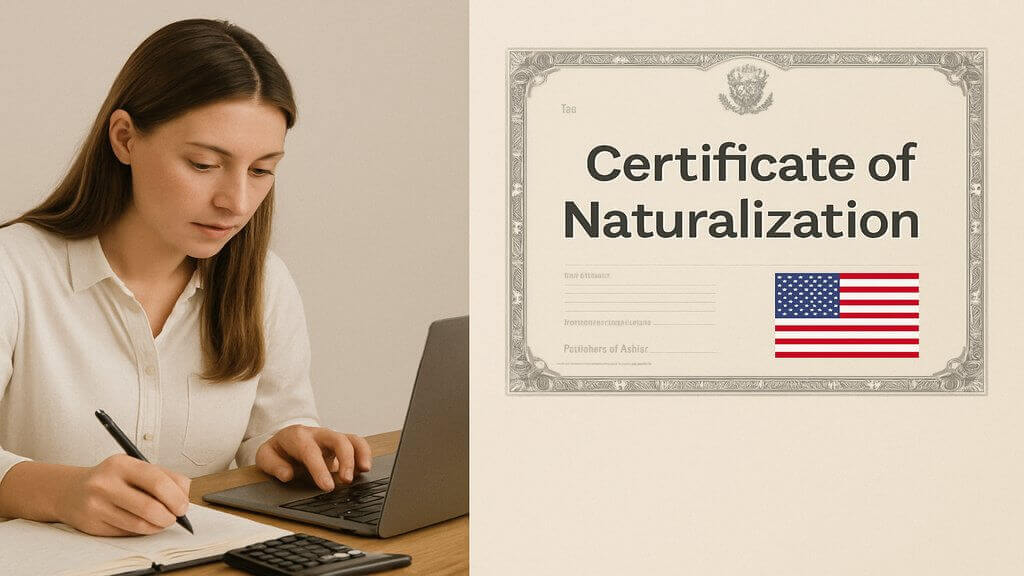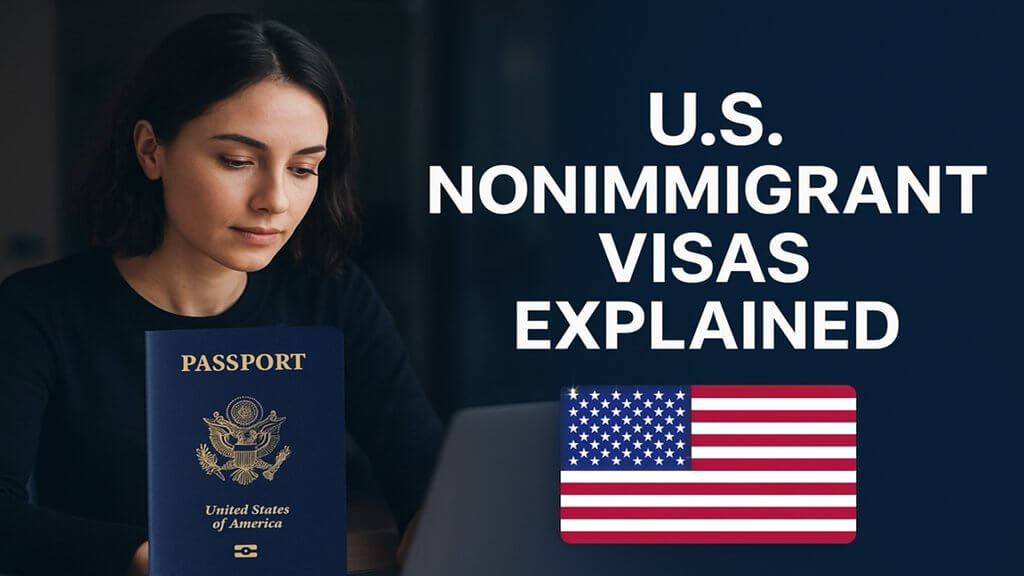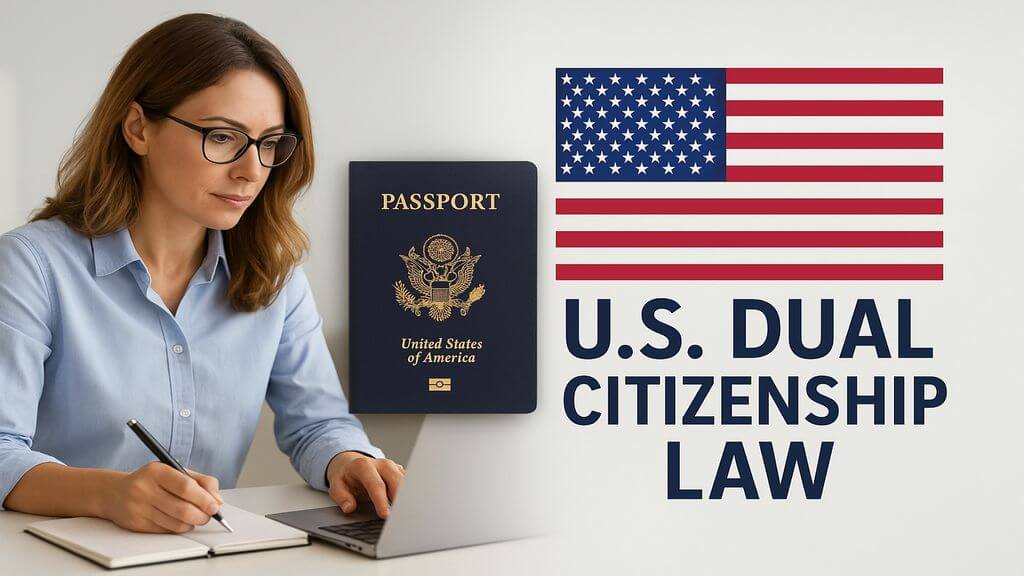A Certificate of Naturalization is an official document issued by U.S. Citizenship and Immigration Services (USCIS) to individuals who have become U.S. citizens through the legal process of naturalization.
This certificate serves as proof of U.S. citizenship and is required for various legal and administrative purposes, such as applying for a U.S. passport or updating your citizenship status with government agencies.
Eligibility requirements
To qualify for naturalization, applicants must meet specific eligibility requirements under the Immigration and Nationality Act (INA), including:
- Lawful permanent residency for a required period (typically 5 years or 3 years if married to a U.S. citizen),
- Good moral character,
- Knowledge of U.S. history and government (civics),
- Ability to read, write, and speak basic English,
- Willingness to take the Oath of Allegiance.
Once approved, applicants attend a naturalization ceremony where they take the oath and receive their Certificate of Naturalization.
Learn about the naturalization process on USCIS.gov
Check Also: U.S. Citizenship Through Naturalization – Complete Guide
Certificate of Citizenship:
A Certificate of Citizenship is issued by USCIS to individuals who:
- Were born outside the United States, but
- Acquired or derived U.S. citizenship automatically through their U.S. citizen parent(s) either at birth or before turning 18.
This certificate confirms that the person is a U.S. citizen by operation of law, without needing to go through the naturalization process.
Common Scenarios:
- A child born abroad to two U.S. citizen parents.
- A foreign-born adopted child of U.S. citizens.
- A lawful permanent resident child whose parent naturalized before the child turned 18 (derivation of citizenship).
Applicants must submit Form N-600, Application for Certificate of Citizenship, along with supporting documents proving eligibility.
Difference Between Certificate of Naturalization and Certificate of Citizenship:
| Feature | Certificate of Naturalization | Certificate of Citizenship |
|---|---|---|
| How Citizenship Is Obtained | Through the naturalization process | Acquired at birth or through parents |
| Application Form | N-400 | N-600 |
| USCIS Interview/Exam Required | Yes | No (usually) |
| Issued After Oath Ceremony? | Yes | No |
| Eligibility | Foreign nationals who meet naturalization criteria | Individuals who automatically acquired citizenship |
| Purpose | Proof of naturalized citizenship | Proof of acquired/derived citizenship |
Naturalization Number:
The Certificate of Naturalization number is a unique 8- or 9-digit number printed on the certificate. You can usually find it:
- Top right corner of the document
- Labeled as “Certificate Number” or “USCIS Registration Number”
This number is essential for:
- Applying for a U.S. passport,
- Proving citizenship to employers,
- Updating records with the Social Security Administration,
- Replacing the certificate if lost or damaged.
Document for Certificate of Naturalization 2025:
A naturalization document is the official proof that a foreign-born individual has become a U.S. citizen through the process of naturalization. The most common naturalization document is USCIS Form N-550, also known as the Certificate of Naturalization.
This certificate includes your:
- Full legal name
- Country of former nationality
- USCIS registration number (A-Number)
- Date and place of naturalization
- Photograph and signature
You will receive this document during your naturalization oath ceremony. It serves as vital proof of citizenship for applying for a U.S. passport, Social Security updates, or government benefits.
Important tip: Always keep your original naturalization document safe. Replacing it can be time-consuming and requires filing Form N-565 with USCIS.
USCIS Form N-550:
Form N-550, officially known as the Certificate of Naturalization, is issued by U.S. Citizenship and Immigration Services (USCIS) after an individual becomes a U.S. citizen through the naturalization process.
Key features of Form N-550:
- Issued only after approval of Form N-400 (Application for Naturalization)
- Not a travel document, but it is proof of U.S. citizenship
- Needed when applying for a U.S. passport, federal jobs, or sponsoring relatives
If your certificate is lost or damaged, you must request a replacement using Form N-565.
Don’t confuse N-550 with N-560 — the latter is for individuals who acquire citizenship through parents and not naturalization.
Certificate of Citizenship vs Naturalization:
Understanding the difference between the Certificate of Citizenship and the Certificate of Naturalization is crucial for proving your U.S. citizenship status:
| Feature | Certificate of Naturalization (N-550) | Certificate of Citizenship (N-560) |
|---|---|---|
| How Obtained | Through naturalization process | Through U.S. citizen parents (by birth or after birth) |
| USCIS Form | Issued after N-400 | Issued after N-600 |
| Used For | Proof of naturalized citizenship | Proof of derived or acquired citizenship |
| Common Users | Immigrants who became citizens | Children of U.S. citizens born abroad |
In short:
- N-550 = You went through the naturalization process
- N-560 = You obtained citizenship automatically or through parents
Proof of U.S. Citizenship:
When you need to prove you are a U.S. citizen, there are several valid documents, each depending on how you obtained citizenship. The most widely accepted proof of U.S. citizenship includes:
- U.S. Passport (valid or expired)
- Certificate of Naturalization (Form N-550)
- Certificate of Citizenship (Form N-560/N-561)
- Consular Report of Birth Abroad (Form FS-240)
- U.S. Birth Certificate (for those born in the U.S.)
These documents are essential for:
- Getting a passport
- Registering to vote
- Applying for federal benefits
- Sponsoring relatives for immigration
Tip: Always provide original documents or certified copies when required. Photocopies may not be accepted by government agencies.
How to Replace a Lost or Damaged Certificate of Naturalization?
If your Certificate of Naturalization is lost, stolen, damaged, or contains incorrect information, you must request a replacement from USCIS.
Steps to Apply for a Replacement:
- Complete Form N-565
Application for Replacement Naturalization/Citizenship Document.
Download or file Form N-565 online - Prepare Required Documents
- Valid government-issued ID (e.g., passport, driver’s license)
- Copy of the lost/damaged certificate (if available)
- Explanation of loss, damage, or correction needed
- Pay the Filing Fee
- The filing fee is $555
- Payment can be made online or by check/money order
Check current USCIS fees
- Submit the Application
- Online via your USCIS account, or
- By mail to the address provided on the N-565 form instructions
Use trackable shipping and keep a copy for your records.
- Wait for Processing
- USCIS processing time typically ranges from 6 to 12 months, depending on the case.
What to Do If Your Certificate Was Stolen?
If your certificate was stolen, follow these steps:
- File a police report with your local law enforcement.
- Indicate the theft when completing Form N-565.
- If you suspect identity theft, report it to the Federal Trade Commission (FTC) at www.identitytheft.gov.
Additional Information:
- Always keep your certificate in a safe, secure place.
- Consider getting a U.S. passport as a secondary form of citizenship proof.
- If applying for government benefits or immigration sponsorship, your certificate may be required.
Frequently Asked Questions:
-
What is a Certificate of Naturalization?
A Certificate of Naturalization is an official document issued by USCIS to foreign nationals who have successfully completed the naturalization process and become U.S. citizens. It serves as legal proof of U.S. citizenship.
-
Who issues the Certificate of Naturalization?
The U.S. Citizenship and Immigration Services (USCIS) is the official government agency responsible for issuing Certificates of Naturalization after a person completes the naturalization process.
-
Where can I find my Certificate of Naturalization number?
The certificate number is usually located in the upper right-hand corner of your Certificate of Naturalization. It is an 8- or 9-digit unique number used to verify your citizenship.






